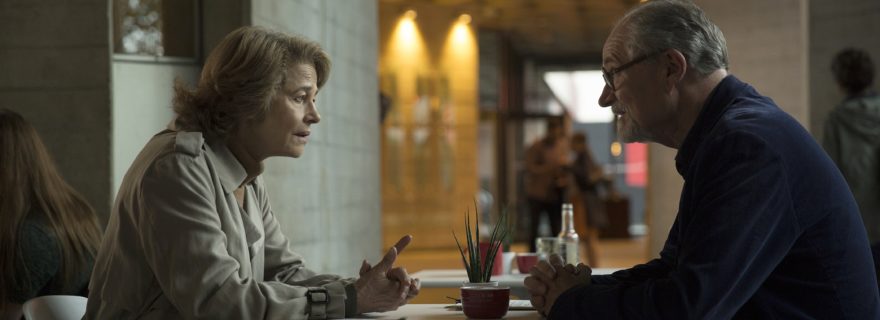'The Sense of an Ending'
Movie Rating:
2.5
There’s something amusing about the fact that ‘The Sense of an Ending’ and ‘T2 Trainspotting’ are being released the same week. Both are British movies about aging and selective memory, but one is thrillingly cinematic and full of surprises while the other is tediously melancholic and predictable. Guess which one is the latter. (Hint: Not ‘Trainspotting’.)
‘The Sense of an Ending’ is one of those well meaning and overbearingly pleasant movies designed to make you feel bad (but not too bad) with the intention of ultimately making you feel good (but not too good). It’s loaded with respectable actors and is based on an award-winning novel. The film is told very seriously and sincerely, making its importance clear. It has grand themes and ideas woven throughout and twists designed to make you go “Hmmmm…” You can take your parents to see it without fear of anyone getting either too excited or too offended, and you’ll walk out of it saying “That was good” before never thinking of it again.
Jim Broadbent stars as Tony, a prickly old guy who runs a vintage camera shop. He lives in a world defined by nostalgia, keen on writing passionate letters and confused by this whole internet thing. He was once married, but is now amicably divorced. His daughter Susie (Michelle Dockery) is pregnant with no interest in finding a father. While Tony is confused enough to express concern, he’s too supportive to not jump on board. Why rock the boat, right? Things are working. Or are they?
One day, Tony receives notice that he’s been left something in a will from the mother of his first love, Veronica (Charlotte Rampling). It’s her diary, and unfortunately Veronica won’t give it to him. That frustrates the old man and causes him to wander down memory lane, remembering how he fell for the girl (who, not coincidentally, gave him his first camera) and then lost her to a best friend, which made him furious. Tony becomes obsessed with this chapter of his past and starts digging up old friends to remind himself of what happened. However, the more he digs, the more he realizes how selective memory can be, especially when everyone wants to be the hero of their own story.
Screenwriter Nick Payne and director Ritesh Batra elegantly mix their flashback and contemporary narratives. They flow together fluidly with dialogue and imagery repeating in both threads, but not always in the manner you’d expect. The movie flows with the messiness of memory, the way the present and the past tend to intertwine with a long forgotten word. It’s quite pleasant, yet ultimately feels inconsequential. While the structure may have proved fascinating on the page where words could spark unexpected diversion and an unreliable narrator would regularly reframe everything that came before, it feels a bit perfunctory on film. The narrative and tragedies therein are so small that they don’t feel dramatic enough to justify all the fuss the film makes about them. That’s likely in the name of realism, but it also ensures that most of the revelations come with a “Huh” rather than the expected “A ha!” It also doesn’t help that the biggest shock moments are so overplayed that they don’t make the intended impact. It’s entirely predictable if you’ve been down these roads in movies before. While there’s a comfort to the familiarity, there’s also a tedium.
The film is professionally made and pretty in all the expected ways without ever delivering a stand-out visual moment that justifies why this story needed to be adapted to the screen. It’s well done, just dryly predictable and a feature-length exercise in going through the motions. The only thing that really stands out in the project is the cast, who are all predictably strong. Jim Broadbent expertly mixes bumbling character comedy and painful melancholy in the way only he can, while Emily Mortimer delivers a vivid and exciting portrayal of a character of great importance yet precious little screen time. Best of all is Charlotte Rampling, who has a pair of impressive scenes that carry all the dramatic weight of the movie. She nails them, of course. She’s a spectacular actress. Unfortunately, the material isn’t really worthy of her talents and frankly that’s true of all the wonderful actors on screen.
‘The Sense of an Ending’ might telegraph a collection of scenes that remind viewers of great drama, but nothing ever comes together with the impact it should. The movie is simply too old-fashioned and too concerned with being polite to do anything that stings emotionally the way that the story is supposed to. Still, for those viewers who enjoy a comforting movie that doesn’t dare challenge any preconceived notions and offers all the predictable dramatic beats that soothe them into submission, this should waste time pleasantly enough.



